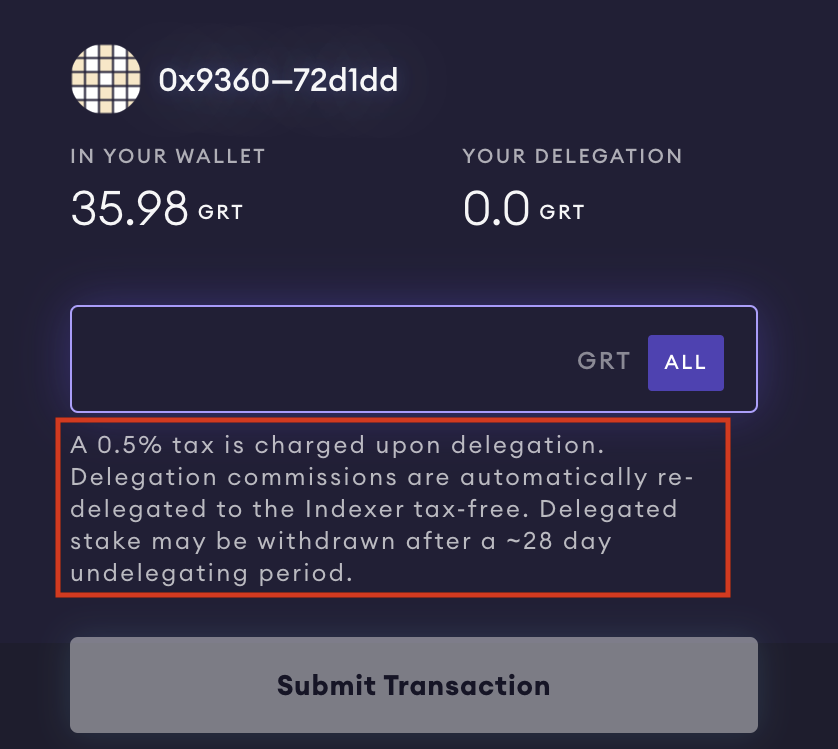5 minutes
Delegazione
To start delegating right away, check out delegate on the graph.
Panoramica
Delegators earn GRT by delegating GRT to Indexers, which helps network security and functionality.
Benefits of Delegating
- Strengthen the network’s security and scalability by supporting Indexers.
- Earn a portion of rewards generated by the Indexers.
How Does Delegation Work?
Delegators earn GRT rewards from the Indexer(s) they choose to delegate their GRT to.
An Indexer’s ability to process queries and earn rewards depends on three key factors:
- The Indexer’s Self-Stake (GRT staked by the Indexer).
- The total GRT delegated to them by Delegators.
- The price the Indexer sets for queries.
The more GRT staked and delegated to an Indexer, the more queries they can serve, leading to higher potential rewards for both the Delegator and Indexer.
What is Delegation Capacity?
Delegation Capacity refers to the maximum amount of GRT an Indexer can accept from Delegators, based on the Indexer’s Self-Stake.
The Graph Network includes a delegation ratio of 16, meaning an Indexer can accept up to 16 times their Self-Stake in delegated GRT.
For example, if an Indexer has a Self-Stake of 1M GRT, their Delegation Capacity is 16M.
Why Does Delegation Capacity Matter?
If an Indexer exceeds their Delegation Capacity, rewards for all Delegators become diluted because the excess delegated GRT cannot be used effectively within the protocol.
This makes it crucial for Delegators to evaluate an Indexer’s current Delegation Capacity before selecting an Indexer.
Indexers can increase their Delegation Capacity by increasing their Self-Stake, thereby raising the limit for delegated tokens.
Delegation on The Graph
Please note this guide does not cover steps such as setting up MetaMask. The Ethereum community provides a comprehensive resource regarding wallets.
There are two sections in this guide:
- I rischi della delegazione dei token in The Graph Network
- Come calcolare i rendimenti previsti come Delegator
Rischi di delegazione
Di seguito sono elencati i principali rischi essere il Delegator nel protocollo.
The Delegation Tax
I delegator non possono essere penalizzati per un comportamento scorretto, ma c’è una tassa sui delegator per disincentivare un processo decisionale insufficiente che potrebbero danneggiare l’integrità della rete.
As a Delegator, it’s important to understand the following:
-
You will be charged 0.5% every time you delegate. This means that if you delegate 1,000 GRT, you will automatically burn 5 GRT.
-
In order to be safe, you should calculate your potential return when delegating to an Indexer. For example, you might calculate how many days it will take before you have earned back the 0.5% tax on your delegation.
The Undelegation Period
When a Delegator chooses to undelegate, their tokens are subject to a 28-day undelegation period.
This means they cannot transfer their tokens or earn any rewards for 28 days.
After the undelegation period, GRT will return to your crypto wallet.
Why is this important?
If you choose an Indexer that is not trustworthy or not doing a good job, you will want to undelegate. This means you will be losing opportunities to earn rewards.
As a result, it’s recommended that you choose an Indexer wisely.

Delegation Parameters
In order to understand how to choose a trustworthy Indexer, you need to understand the Delegation Parameters.
- Indexing Reward Cut - The portion of the rewards the Indexer will keep for themselves.
- If an Indexer’s reward cut is set to 100%, as a Delegator, you will get 0 indexing rewards.
- If it is set to 80%, as a Delegator, you will receive 20%.

-
Query Fee Cut - This is just like the Indexing Reward Cut, but it applies to returns on the query fees that the Indexer collects.
-
It is highly recommended that you explore The Graph Discord to determine which Indexers have the best social and technical reputations.
-
Many Indexers are active in Discord and will be happy to answer your questions.
Calculating Delegators Expected Return
Calculate the ROI on your delegation here.
A Delegator must consider a variety of factors to determine a return:
An Indexer’s ability to use the delegated GRT available to them impacts their rewards.
If an Indexer does not allocate all the GRT at their disposal, they may miss out on maximizing potential earnings for both themselves and their Delegators.
Indexers can close an allocation and collect rewards at any time within the 1 to 28-day window. However, if rewards are not promptly collected, the total rewards may appear lower, even if a percentage of rewards remain unclaimed.
Considerando la riduzione delle tariffe di query e la riduzione delle tariffe di indicizzazione
You should choose an Indexer that is transparent about setting their Query Fee and Indexing Fee Cuts.
The formula is:

Considerando il delegation pool del Indexer
Delegators should consider the proportion of the Delegation Pool they own.
All delegation rewards are shared evenly, with a pool rebalancing based on the amount the Delegator deposited into the pool.
This gives the Delegator a share of the pool:

The formula above shows that it is possible for an Indexer offering only 20% to Delegators to provide a better reward than an Indexer giving 90%. Simply do the math to determine the best reward.
FAQ e bug dei Delegator
MetaMask “Transazione in sospeso” Bug
At times, attempts to delegate to Indexers via MetaMask can fail and result in prolonged periods of “Pending” or “Queued” transaction attempts.
A simple resolution to this bug is to restart the browser (e.g., using “abort:restart” in the address bar), which will cancel all previous attempts without gas being subtracted from the wallet. Several users who have encountered this issue have reported successful transactions after restarting their browser and attempting to delegate.